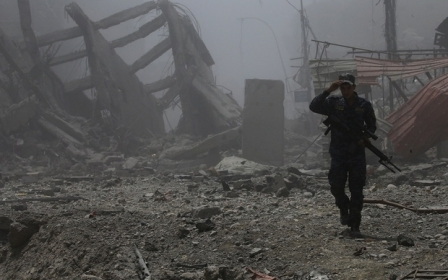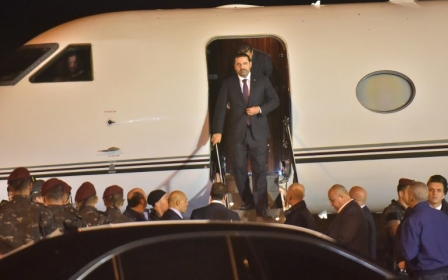Sadr calls for Hashd al-Shaabi to disarm and not stand in elections

Influential Iraqi cleric Muqtada al-Sadr has called for the leaders of the Hashd al-Shaabi forces not to take part in upcoming parliamentary elections, and to hand over their weapons to state forces.
He also called on his own militia, Saraya al-Salam, to disarm and give their weapons to the government, following the announced defeat of the Islamic State group in Iraq.
The Hashd al-Shaabi - also known as Popular Mobilisation Units (PMUs) - are enormously popular across Iraq for what is seen as their pivotal role in defeating IS and preventing the group from reaching Baghdad during their first major offensive in 2014.
However, the sectarian and Shia theocratic nature of some of the groups - the most powerful of which are heavily backed by Iran - and reports of human rights abuses have led to concerns about the impact they could have on Iraqi domestic politics.
In a speech broadcast on Iraqi television on Monday, Sadr said the government should remove the "uncontrollable elements” in the PMUs and punish those responsible for human rights violations - a move he said would be crucial in “preserving the PMUs' reputation”.
“We ask the Iraqi government not to allow the Hashd al-Shaabi, under any circumstances, to participate in the elections, and to prevent PMU leaders from running,” Sadr said.
“We advise our brothers in all factions of the Hashd al-Shaabi to hand over their weapons to the federal government and work to strengthen it by enabling it to impose its control over all of Iraq’s territory,” Sadr continued.
However, several Iran-backed PMUs have already announced their intention to run as a coalition in the elections.
The Mujahideen Alliance was announced in early December, consisting of Asaib Ahl al-Haq, Harakat al-Nujaba, Kataib Hezbollah and other Shia groups.
"There is a mutual understanding between the forces that participated in the defence of the nation," said Laith al-Adthari, a spokesman for Asaib Ahl al-Haq.
He said the grouping was open "to all blocs and political factions" but emphasised "the initial factions will be those that defended the soil of the homeland".
Many of the groups involved have previously been involved in fighting the US occupation and are loyal to Iran's Supreme Leader Ali Khamenei.
Akram al-Kaabi, leader of Harakat al-Nujaba, has previously suggested he would overthrow the Iraqi government if ordered to by Khamenei, and complained that the "secular" government of Iraq did "not meet our ambitions as Islamists".
In comparison to Iran-backed Shia groups, Sadr has long pushed a non-sectarian Iraqi nationalist line and has criticised both American and Iranian intervention in Iraq.
Recent months have seen him make trips to Iran's regional rival Saudi Arabia and call for Syria's Iran-backed president, Bashar al-Assad, to step down.
Some analysts have seen Sadr's popularity, his willingness to engage with the Sunni community in Iraq and his public condemnations of corruption as a sign that he could be a unifying force in a country still racked by sectarianism and instability.
"In the long run, al-Sadr and his organisation are ill-equipped to engage in the business of governance; they lack the capacity to translate mobilisation into public policy and ultimately are part of the problems that plague Iraq," wrote Ranj Alaaldin, a visiting fellow at the Brookings Doha Centre.
"Through the sheer pressure of mobilising the masses, the Sadrist movement could, nevertheless, engineer the space that allows for a culture of accountability to emerge, which Iraq’s reformist actors could then capitalise on, with the necessary support from the region and the international community."
Middle East Eye propose une couverture et une analyse indépendantes et incomparables du Moyen-Orient, de l’Afrique du Nord et d’autres régions du monde. Pour en savoir plus sur la reprise de ce contenu et les frais qui s’appliquent, veuillez remplir ce formulaire [en anglais]. Pour en savoir plus sur MEE, cliquez ici [en anglais].





